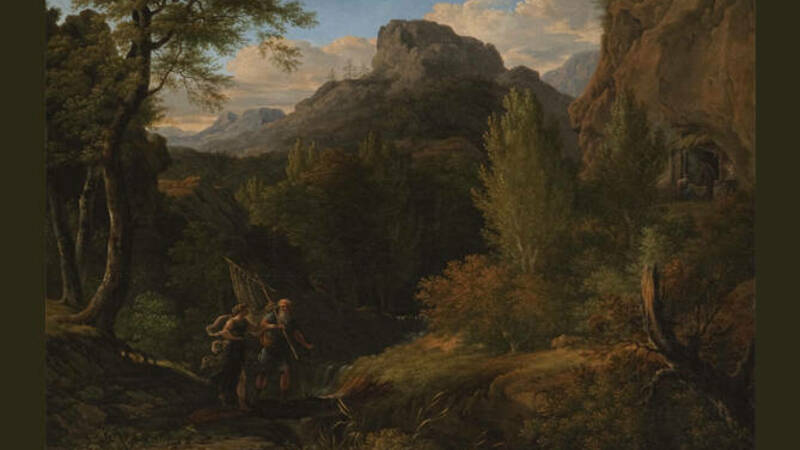It's cold and it's November. I'm sitting, alone. My stool, my notebook, my pen. The air is still, and I hear not a sound. I hate the winter. I've watched a canvas for nearly an hour now. It hasn't moved. Neither have I. The painting is named Psyche Led to Love. I misread it the first time I read the nameplate. I thought it was called Psyche Searching for Love. That doesn't matter, I don't think. I know the myth—Cupid loves Psyche, Psyche doubts her lover, Cupid flees. Psyche searches for her lover. The painting is in a corner, and, though framed in gold, it hasn't many viewers. Maybe the trees are too dark, maybe the hills too foreboding. No one is around.
Psyche wears green. She's following someone—a fisherman, the plaque tells me—and she's hurrying. Her scarf trails behind her, wafting over ancient air. Or maybe it's blown by a summer breeze—the one that rises when twilight falls and the pool you used to work at closes for the night, the fireflies lighting softly, drifting gently across something that smells like lilacs and petunias. I loved those starlight summer evenings.
But I can't daydream for long. It's not summer anymore. Psyche hasn't found her lover. Cupid is still just a dream, a wisp on the winds, a happy, sad, beautiful memory. I wonder if Psyche's smiling. I look closer to see her face, but her head is turned forward. Whatever she feels now doesn't matter, I realize at once. I know how her story ends. She does, too. That doesn't make me feel any better.
I was with my classmates, earlier. We all came to the museum together, because we all have to write an essay about some painting. They've all since left. I guess that means they're finished spending time with their paintings, ready to move on. I'm still here, staring at this lonely canvas rimmed in gold under the golden florescent accent-lights.
But I hear something. I turn. A little girl is looking at portraits of upright Englishmen and old, wealthy ladies. She's wearing a little red coat with little gray boots underneath. I can't see her face. She's alone. Search for your lover, I think, search on. Look across those canvases, look over every brush stroke. Gaze deep into the eyes of the men towering above you, ask for kisses from their painted mouths. They've already turned away their faces, I'll bet, as they dance across fallen logs and winding streams. You are alone. I am alone.So I look at Psyche. She dances across the log, following a fisherman following her heart. But she isn't dancing. She's walking on air. I'm sitting on a stool. The winter comes quickly up here, and I don't have a heavy coat. I hate the winter. The painting is so beautiful, and so perfect. The leaves are green, the sky is blue. And Psyche searches for her lover, over the stream, across the log, with a fisherman to guide her way. I'm not. I'm sitting alone in an art museum on an old, sagging stool. All I can see is a picture of a lover in a golden frame. So I lean forward and look closer.
And I again hear gentle footsteps. A man walks into the room, pushing a stroller. The little girl turns away from the paintings. I see her face now. She's smiling. "Daddy," she cries, and rushes to her father. He quiets her with a gentle shhhh, and he lifts her into his arms. He's smiling, too. "Come along, now," he says softly, "it's time to go home." They walk out together in the golden afternoon light, the father leading the way, the girl dancing in childish joy right behind.
I look away from the family. I look down. My notebook has only three words written on it. Searching for love. And a beautiful feeling washes over me. It feels like the smell of summer when the cottonwood falls and the clouds drift beyond the horizon. It feels like the chill of autumn rising from a musky hay-bale around the burned-out bonfire. It feels like the touch of winter glistening round the edges of pine needles and smudged window-panes. It feels like the breath of spring drifting up from the freshened earth and pink-shale flower blossoms.
I stood up. I folded my stool and closed my notebook. I found my backpack in the cubby where I had left it an hour earlier. I stepped outside. The sun was shining with not a cloud in sight. Psyche will find her lover. I know how the myth ends. She's lucky. I have no fisherman to guide me onwards. I do not know where my heart lies. But I know it lies beyond the canvas I gazed at for near an hour, beyond the golden-lit gallery of 18th century art, beyond those beautiful museum walls.
And so I stepped outside. My words, my heart I've spilled on this paper canvas—simple, sharpened, shattered glass. Each crystal shard glistens under the golden tungsten accent-lights. The sparkle might remind you of the stars you saw between the leafy branches of the oak over the pool you used to work at in the summertime. So maybe tonight you'll dream a little clearer. Dream, and dream well. Dream of your lover. But, please, dream beyond this simple canvas. Dream beyond these beautiful museum walls. I'm standing outside right now. And it's a beautiful day.

